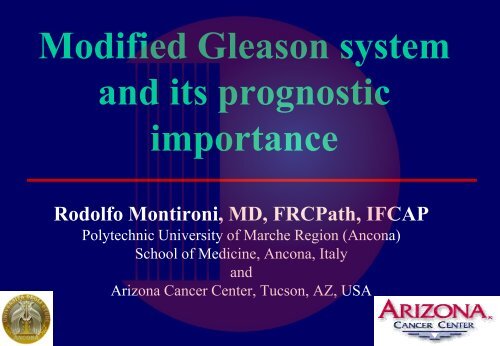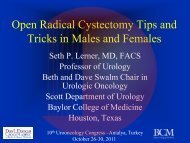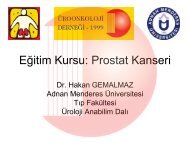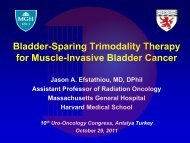Gleason grading system
Gleason grading system
Gleason grading system
You also want an ePaper? Increase the reach of your titles
YUMPU automatically turns print PDFs into web optimized ePapers that Google loves.
Modified <strong>Gleason</strong> <strong>system</strong><br />
and its prognostic<br />
importance<br />
Rodolfo Montironi, MD, FRCPath, IFCAP<br />
Polytechnic University of Marche Region (Ancona)<br />
School of Medicine, Ancona, Italy<br />
and<br />
Arizona Cancer Center, Tucson, AZ, USA
<strong>Gleason</strong> <strong>grading</strong> <strong>system</strong><br />
• Quintessential prognostic factor in<br />
predicting<br />
1. findings in radical prostatectomy<br />
2. biochemical failure<br />
3. local recurrences<br />
4. lymph node or distant metastasis<br />
• in patients receiving<br />
• radical prostatectomy, radiation therapy and other<br />
therapies, including AS<br />
• All predictive models incorporate the GS
<strong>Gleason</strong> <strong>grading</strong> <strong>system</strong><br />
• 1966: Donald F. <strong>Gleason</strong><br />
created a unique <strong>grading</strong><br />
<strong>system</strong> for PCa:<br />
• sum of the two most common<br />
architectural patterns and<br />
reported as the “<strong>Gleason</strong> score”
<strong>Gleason</strong> score 3+3=6 PCa<br />
<strong>Gleason</strong> score 4+4=8 PCa
1977: <strong>Gleason</strong> provided comments on<br />
the application of the <strong>Gleason</strong> <strong>system</strong><br />
1. Grading is performed under low magnification<br />
2. An occasional small area of fused glands does not<br />
change a pattern 3 tumour to pattern 4<br />
3. The cribriform tumour under <strong>Gleason</strong> pattern 3 is<br />
described as having a “smooth and usually rounded<br />
edge”<br />
4. Occasionally, small areas of a third pattern are<br />
observed
PCa has changed dramatically since the late<br />
1960s (type of patients)<br />
• In 1966 there was no screening for<br />
PCa other than by DRE, as serum<br />
PSA had not yet been discovered<br />
• In <strong>Gleason</strong>’s studies, the vast majority<br />
of men had advanced disease with<br />
either local extension out of the<br />
prostate on DRE or distant metastases
PCa has changed dramatically since the late<br />
1960s (type of specimens)<br />
• The method of obtaining prostate<br />
tissue was also different from today’s<br />
practice<br />
• In the 1960s, radical prostatectomy<br />
was relatively uncommon<br />
• The <strong>Gleason</strong> <strong>system</strong> also predated<br />
the use of immunohistochemistry
45 years after the inception of the <strong>Gleason</strong><br />
<strong>system</strong><br />
• The GS remains one of the most powerful<br />
prognostic factors in PCa<br />
1. Certain aspects of the original GS interpreted<br />
differently in today’s practice<br />
2. Variations in applying the GS amongst<br />
pathologists with some differences regional<br />
in nature and others dependent on other<br />
demographic factors
International Society of Urological<br />
Pathology (ISUP)<br />
2005 ISUP Modified <strong>Gleason</strong> System<br />
ISUP consensus conference in San<br />
Antonio, TX, in 2005<br />
Am J Surg Pathol 2005 Sept;(29):1228
2005 ISUP Modified <strong>Gleason</strong> System<br />
1. A <strong>Gleason</strong> score of 1+1=2 should not be diagnosed, regardless<br />
of the type of specimen, with extremely rare exception<br />
2. The diagnosis of <strong>Gleason</strong> score 2-4 should not be made on<br />
needle biopsies<br />
3. “Individual cells” would not be allowed within <strong>Gleason</strong><br />
pattern 3<br />
4. The vast majority of cribriform patterns are diagnosed as<br />
<strong>Gleason</strong> pattern 4 with only rare cribriform lesions satisfying<br />
diagnostic criteria for cribriform pattern 3C
Reasons for not assigning <strong>Gleason</strong><br />
score 2–4 on needle biopsy<br />
1. Extraordinarily rare in needle biopsies as<br />
compared to transurethral resection specimens<br />
2. Poor reproducibility among experts for lower<br />
grade tumours<br />
3. Poor correlation with the prostatectomy score<br />
for <strong>Gleason</strong> 2-4 tumours<br />
4. May misguide clinicians and patients into<br />
believing that there is an indolent tumour
Cribriform <strong>Gleason</strong> pattern 3 PCa<br />
• Resembles cribriform HGPIN, yet shows<br />
diagnostic features of infiltrating carcinoma<br />
such as:<br />
1. glands negative for basal cell markers<br />
2. back-to-back glands, ruling out high-grade<br />
prostatic intraepithelial neoplasia or<br />
3. glands exhibiting pathognomonic features of<br />
carcinoma such as perineural invasion or EPE
Cribriform pattern 3<br />
Cribriform pattern 4
2005 ISUP Modified <strong>Gleason</strong><br />
System<br />
Tertiary <strong>Gleason</strong> pattern<br />
1. On needle biopsies with patterns 3, 4, and 5,<br />
both the primary pattern and the highest grade<br />
should be recorded<br />
2. For a radical prostatectomy specimen one<br />
assigns the <strong>Gleason</strong> score based on the primary<br />
and secondary patterns with a comment as to<br />
the tertiary pattern
Am J Surg Pathol 2005 Sept;29:1228-42
Impact of the modified <strong>Gleason</strong><br />
<strong>grading</strong> <strong>system</strong><br />
The most immediate result of limiting the<br />
definition of <strong>Gleason</strong> pattern 3 and<br />
expanding the definition of pattern 4 has<br />
been <strong>Gleason</strong> grade migration or up-<strong>grading</strong><br />
<strong>Gleason</strong> score 6 cancers decreased from 48% to<br />
22% of cases, whereas <strong>Gleason</strong> score 7<br />
increased from 25% to 68%
Impact of the modified <strong>Gleason</strong><br />
<strong>grading</strong> <strong>system</strong><br />
An important effect of modifying <strong>Gleason</strong> <strong>grading</strong> has<br />
been to improve the agreement between <strong>Gleason</strong> scores<br />
on needle biopsy and radical prostatectomy<br />
Prior to the 2005 ISUP modification, the agreement ranged between 28 to<br />
68%<br />
ISUP modified <strong>Gleason</strong> <strong>system</strong>:<br />
Exact agreement between needle biopsy and radical prostatectomy<br />
specimens increased from 58% to 72% when using the modified<br />
<strong>system</strong> (Helpap et al, 2006)<br />
Zareba et al (2009) showed no significant impact on the biopsyradical<br />
prostatectomy <strong>Gleason</strong> agreement (63.4% and 65.5%,<br />
respectively)
Impact of the modified <strong>Gleason</strong><br />
<strong>grading</strong> <strong>system</strong><br />
An important consequence of changes to the<br />
definition of <strong>Gleason</strong> pattern 4 has been an<br />
improvement in observer reproducibility<br />
1. <strong>Gleason</strong> wrote that he duplicated exactly his previous<br />
histological scores approximately 50% of times<br />
2. Most studies using the modified <strong>Gleason</strong> <strong>system</strong> have shown<br />
that overall observer reproducibility hovers around 80%
Clinical implications of the modified<br />
<strong>Gleason</strong> <strong>grading</strong> <strong>system</strong><br />
There are clinical consequences with the up-<strong>grading</strong><br />
in the <strong>Gleason</strong> score, for instance, in the type of<br />
therapy offered to an individual patient with PCa<br />
Patients with high grade tumours may be discouraged:<br />
from undergoing RP because of the high likelihood of<br />
non-organ confined and even <strong>system</strong>ic disease at<br />
presentation<br />
from undergoing AS
Clinical implications of the modified<br />
<strong>Gleason</strong> <strong>grading</strong> <strong>system</strong><br />
The true test of the validity of the 2005 ISUP<br />
Modified <strong>Gleason</strong> System is its correlation with<br />
patient outcome<br />
Studies by Uemura et al. (2009) and Billis et al.<br />
(2008) demonstrated that the <strong>Gleason</strong> scores on<br />
needle biopsies using the modified but not the<br />
original <strong>Gleason</strong> <strong>system</strong> correlated with progression<br />
after radical prostatectomy
Clinical implications of the modified<br />
<strong>Gleason</strong> <strong>grading</strong> <strong>system</strong><br />
The true test of the validity of the 2005 ISUP<br />
Modified <strong>Gleason</strong> System is its correlation with<br />
patient outcome<br />
Delahunt et al. (2010) reported that the original<br />
<strong>Gleason</strong> <strong>grading</strong> <strong>system</strong> outperformed the<br />
modified <strong>system</strong> in predicting PSA nadir<br />
following external beam radiotherapy and<br />
hormone therapy
Subsequent (2010) proposals for slight<br />
modifications of the ISUP <strong>grading</strong> <strong>system</strong><br />
All cribriform patterns are diagnosed<br />
as <strong>Gleason</strong> pattern 4 rather than<br />
pattern 3<br />
Glomerulations most likely represent<br />
an early stage of cribriform pattern 4<br />
cancer and should likely be graded as<br />
pattern 4
Original <strong>Gleason</strong> ISUP 2005 <strong>Gleason</strong> 2010 <strong>Gleason</strong>
Conclusions<br />
• The GS has remained timely by gradual<br />
adaptations of the <strong>system</strong> to accommodate<br />
the changing practice of medicine<br />
• 2005 ISUP Modified <strong>Gleason</strong> System<br />
• The oncologists, urologists and<br />
pathologists have to be aware of the impact<br />
on patient’s prognosis and treatment of the<br />
GS used





